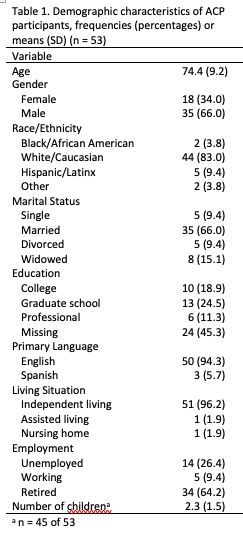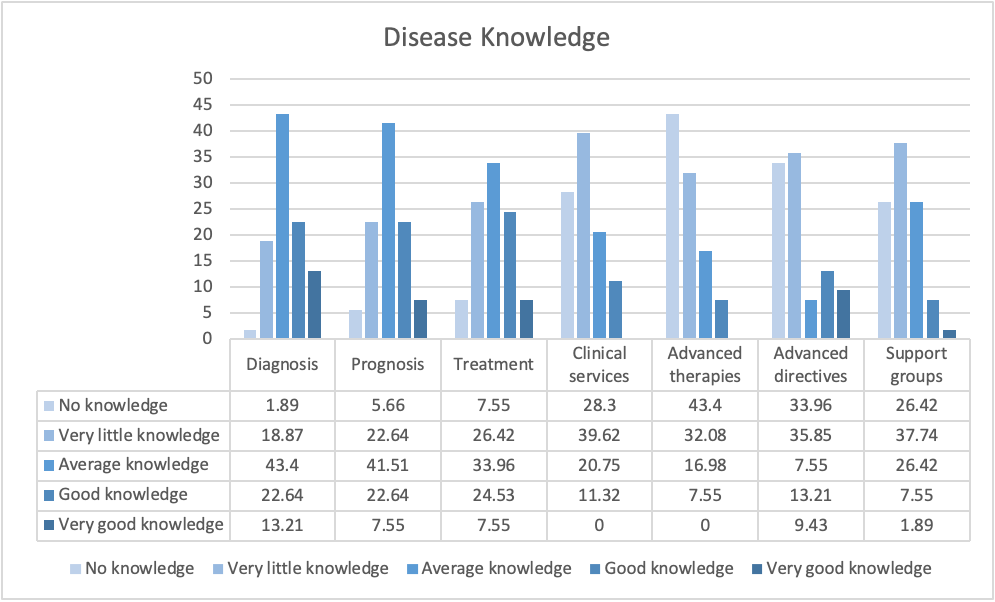Category: Other
Objective: Evaluate disease knowledge in patients with Parkinson’s disease in an Advance Care Planning (ACP) clinic.
Background: Poor disease knowledge has been associated with misconceptions in PD and identified as an important gap in patient-centered care.
Method: This is a cross-sectional study of PD patients who attended the ACP clinic in the past year.
Disease knowledge was divided into 7 topics (diagnosis, prognosis, treatment, clinical services, advanced therapies, advanced directives and support groups).
Each item was assessed using a patient-rated, 5-item Likert scale (0-no knowledge; 1-very little knowledge; 2-average knowledge; 3-good knowledge;4-very good knowledge) about their knowledge.
Demographic characteristics were recorded and questionnaires were completed for disease stage (HY), progression (UPDRS), symptom burden (ESAS), quality of life (PDQ-39), cognitive changes (MOCA), and depression (GDS).
Results: A total of 53 patients were seen at the ACP clinic. The mean age was 74.4 ± 9.2 years, 34% females, and a mean H&Y of 2.3 ± 0.6, with disease duration 6.3 ± 5.5 years.
IPD was the most frequent diagnosis in 48/53 (90.6%) of patients. Depression based on GDS (>4) was seen on 58.8% of these patients while cognitive changes were detected by MOCA (<26) in 16/28 (57.1%) patients.
Patients reported their knowledge below average for diagnosis (20.8%), prognosis (28.3%), treatment (34%), clinical services (67.9%), advanced therapies (75.5%), advanced directives (69.8%), and support groups (64.2%).
Conclusion: Our study described the disease knowledge of PD patients evaluated in an advance care planning (ACP) clinic. While our patients had an average or above knowledge of their diagnosis, prognosis, and treatment, the knowledge regarding clinical services, advanced therapies, advanced directives, and support group were very low.
References: for the growing burden of neurodegenerative conditions,” Neurology, vol. 80, no. 21, pp. 1989–1996, May 2013, doi: 10.1212/WNL.0b013e318293e2ce.
[2] E. R. Dorsey et al., “Projected number of people with Parkinson disease in the most populous nations, 2005 through 2030,” Neurology, vol. 68, no. 5, pp. 384–386, 2007, doi: 10.1212/01.wnl.0000247740.47667.03.
[3] M. A. Hely, W. G. J. Reid, M. A. Adena, G. M. Halliday, and J. G. L. Morris, “The Sydney Multicenter Study of Parkinson’s disease: The inevitability of dementia at 20 years,” Mov. Disord., vol. 23, no. 6, pp. 837–844, Apr. 2008, doi: 10.1002/mds.21956.
[4] O. Bernal-Pacheco, N. Limotai, C. L. Go, and H. H. Fernandez, “Nonmotor manifestations in parkinson disease,” Neurologist, vol. 18, no. 1. Neurologist, pp. 1–16, Jan. 2012, doi: 10.1097/NRL.0b013e31823d7abb.
[5] C. Vossius, O. B. Nilsen, and J. P. Larsen, “Parkinson’s disease and nursing home placement: The economic impact of the need for care,” Eur. J. Neurol., vol. 16, no. 2, pp. 194–200, Feb. 2009, doi: 10.1111/j.1468-1331.2008.02380.x.
[6] J. J. Strand, M. M. Kamdar, and E. C. Carey, “Top 10 things palliative care clinicians wished everyone knew about palliative care,” Mayo Clinic Proceedings, vol. 88, no. 8. Elsevier Ltd, pp. 859–865, 2013, doi: 10.1016/j.mayocp.2013.05.020.
[7] J. A. C. Rietjens et al., “Definition and recommendations for advance care planning: an international consensus supported by the European Association for Palliative Care,” The Lancet Oncology, vol. 18, no. 9. Lancet Publishing Group, pp. e543–e551, Sep. 01, 2017, doi: 10.1016/S1470-2045(17)30582-X.
[8] B. M. Kluger et al., “Palliative care and Parkinson’s disease: Meeting summary and recommendations for clinical research,” in Parkinsonism and Related Disorders, Apr. 2017, vol. 37, pp. 19–26, doi: 10.1016/j.parkreldis.2017.01.008.
[9] B. M. Kluger et al., “Comparison of Integrated Outpatient Palliative Care with Standard Care in Patients with Parkinson Disease and Related Disorders: A Randomized Clinical Trial,” JAMA Neurol., vol. 77, no. 5, pp. 551–560, May 2020, doi: 10.1001/jamaneurol.2019.4992.
[10] M. R. Salinas et al., “Patient perceptions and knowledge of Parkinson’s disease and treatment (KnowPD),” Clin. Park. Relat. Disord., vol. 3, p. 100038, Jan. 2020, doi: 10.1016/j.prdoa.2020.100038.
[11] P. Viwattanakulvanid, R. Somrongthong, M. Vankwani, F. Kavita, and R. Kumar, “Predictors and level of knowledge regarding Parkinson’s disease among patients: A cross-sectional study from Thailand,” Int. J. Prev. Med., vol. 11, no. 1, p. 25, Jan. 2020, doi: 10.4103/ijpvm.IJPVM_221_19.
[12] R. Bhidayasiri et al., “Delivering patient-centered care in Parkinson’s disease: Challenges and consensus from an international panel,” Parkinsonism and Related Disorders, vol. 72. Elsevier Ltd, pp. 82–87, Mar. 01, 2020, doi: 10.1016/j.parkreldis.2020.02.013.
To cite this abstract in AMA style:
B. Rodrigues, E. Cournean, N. Prakash, D. Costello, K. Badiola, C. Selvadurai. Advance Care Planning and Parkinson’s disease: patient knowledge assessment [abstract]. Mov Disord. 2022; 37 (suppl 2). https://www.mdsabstracts.org/abstract/advance-care-planning-and-parkinsons-disease-patient-knowledge-assessment/. Accessed July 14, 2025.« Back to 2022 International Congress
MDS Abstracts - https://www.mdsabstracts.org/abstract/advance-care-planning-and-parkinsons-disease-patient-knowledge-assessment/


